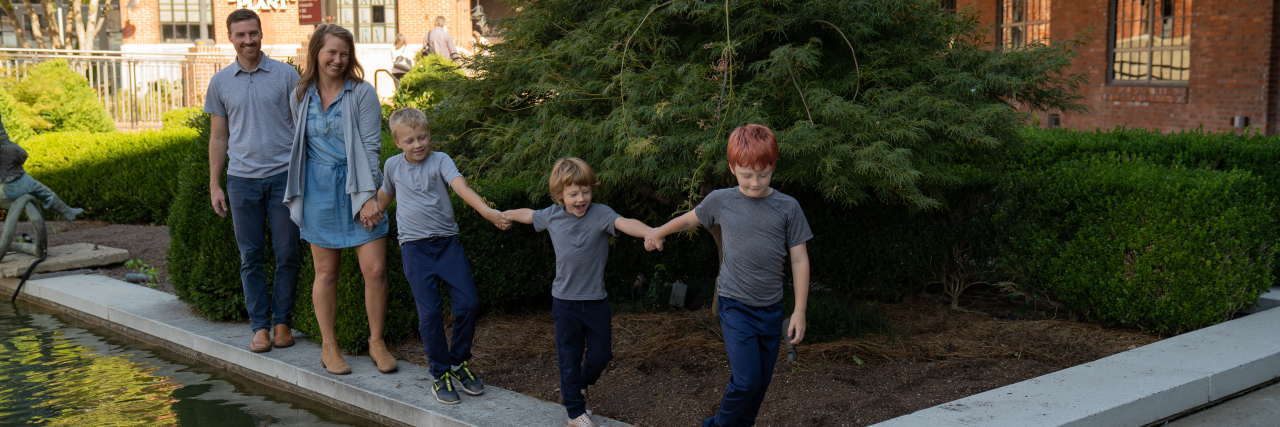I watch as my anxious, autistic 6-year-old steps into his third new school of the year. I watch his flame of red hair and freckled nose as he washes his hands and stands near the fence, not able to join in.
He has rejected two schools so far, crumbling under their pressure and routines. We have a square peg, and the world is a factory of round holes. There are plenty of machines ready to grind him down, but what if we love his shape? The third school is as lovely as I hoped — muddy play in a backyard accompanied by an energetic grandma who loves to see children learn in their own quirky ways.
As the days and weeks pass, I begin to believe. A spark of hope rises that maybe he has found a home.
But then, on a particularly crisp fall day in October, after weeks of attending without issue, my beloved boy refuses to go to this beloved school. I cajole him into unbuckling and walking toward the entrance. But then he digs in even farther, stubbornly pressing his solid body backward, dragging me away.
I say: “I see this is hard for you. I am going to help you.”
These words feel foreign, wooden, and unfamiliar in my mouth. I got them from my gurus.
I live with a chorus of parenting experts in my head. They are my gurus, and they sing to me: There’s a best way to do this! I’ll teach you to be a great mom, not like all those other bad moms out there. They aren’t always judgy; sometimes they lavish praise: Best mom ever! Sometimes they sing so loudly I can’t hear myself think.
As I watch my struggling child, now grabbing my hand and pulling me toward the car, my gurus sing loudly. Push him. Don’t let him avoid.
So I pick him up, writhing and screaming in my arms. 60 pounds of fear and fury, fighting for his life. I carry/drag him toward his teacher, murmuring sweet, affirming words in his ear.
Good, good, stay connected. My gurus are pleased.
I pass him off into his teacher’s tightly bound arms. I turn and walk away and do not look back.
I can’t stop thinking about it. I try to describe what happened to a friend, but it sounds routine. Kids cry at drop-off all the time. You shouldn’t break down over this.
I pick him up a few hours later and he is overjoyed that I have returned. Something icy in my lower belly melts. Maybe it’s OK, I whisper to myself as we walk toward our car. But by the time I slide into the front seat, I know that it’s not OK. He bangs his hands on the window. He screams, “shut up!” every time I try to speak. He is furious, his rage washes over me in radiating waves. By the time we get home, he is not speaking.
The next day is blurry with tears. I report to my son’s teacher that I am sure he will return to school soon. But soon does not come. Instead: Silence, hollow eyes, no eating, locked door, angry banging, breaking, rage.
I am re-reading my parenting books, seeking the places where the experts admit that even when you do your best, these strategies don’t work as planned. How do we get back to their Right Path from the deep, dark woods where we seem to have stumbled? I am certain that it is my fault. I am failing, failed.
Our free fall is steep. Days and weeks pass, and my son and I are on a twin descent. I lean my cheek against his locked door listening to him breathe, holding my own breath, silent so that he does not scream at me. I slide food under his door; he kicks the door so hard it rattles the hinges.
But then a glimmer of fierce intuition rises up. What if we did not fail? What if the system failed me and my son? My parenting books collect dust. I begin to respect his space, his healing. We rediscover one another, like wild animals exploring spring after a long hibernation. We sit in silence, a gentle touch connecting us, fingers interlacing, and eventually, words follow. I bring him a bowl of pretzels and set them down silently. He looks up, smiles, “Thanks, Mom!” I sit and weep with gratitude. I am grateful for every healing glance, every hug, every giggle. The world is filled with round holes, but our home doesn’t need to be one. This boy and I begin to explore the corners, carving out a square home where we can all belong.
I do not need gurus anymore to tell me how to connect with my child. No expert chorus dulls my hearing or blocks my inner voice. The days of shaming myself for getting it wrong, for being wrong, are over. I have hard-won confidence that I know my child, that he knows himself, and that connection and trust are the core of all good parenting. Now I believe that it is good to step off the Right Path and explore the woods for a while.
As my son and I walk this path together, hand in hand, I eventually realize that my son is in the lead, confidently walking his own path, while I walk behind, beaming. Neither of us needs gurus to shape a good life. All we need is one another.

